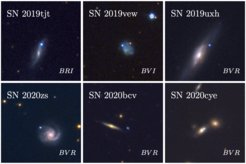Otto Hahn Medal for Christian Vogl
One of the most important questions in cosmology concerns today's expansion rate of the Universe, the so-called Hubble constant. Not only does it determine the age of the Universe; it also shows up as a scale factor in nearly all other cosmological parameters. The results of recent investigations are discrepant, however. Therefore, a precision measurement is urgently needed.

In his thesis, Christian Vogl has succeeded to develop a new and independent method to determine Hubble's constant based on observations of supernova explosions. First, he extended an existing radiation transfer code for the physical conditions present in the atmosphere of a massive-star explosion. The code now accurately simulates the supernova emission for a wide range of atmospheric conditions, making it possible to infer the luminosity of the exploding star and therefore its distance. Then, he added machine-learning tools to efficiently and quickly determine the photospheric parameters from supernova spectra, which he used on a few test cases to check the validity. The new tools were then applied to a small sample of literature data as a proof of concept for his method. Based on only six objects, he obtained the Hubble constant with an uncertainty that is competitive with other existing methods.
The first results are consistent with conventional local determinations, but disfavour those on cosmological scales. Currently, Christian Vogl continues his research as a postdoc at the MPA supported by the Excellence Cluster ORIGINS. He is now working on an ambitious observational programme at the ESO Very Large Telescope. The high-redshift supernova data, which is currently being collected, will enable an even more precise measurement of the Hubble constant.
